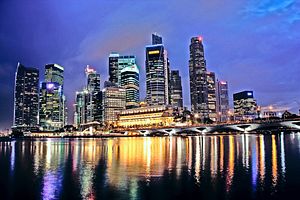Last January, Singapore Prime Minister Lee Hsien Loong told parliament about the need to implement some reforms in the country’s political system which would entail some constitutional amendments.
In support of the proposal to strengthen the country’s elected presidency system, a constitutional commission headed by Chief Justice Sundaresh Menon was established. After six months of conducting consultations and reviewing 107 submissions from the public, the commission submitted its official recommendations to the government last week.
The commission has proposed the following major reforms, among others:
1. Candidates for the elected presidency must have a long experience in management.
From the public sector, candidates can be a former or incumbent minister, chief justice, speaker of parliament, attorney-general, and permanent secretary. But they must have held the position for at least six years.
Nominees from the private sector should be the most senior executive in a company and his or her shareholders’ equity should be at least $500 million. The current requirement is only $100 million. Further, the company must have recorded a net profit and must not have gone into liquidation.
2. A reserved election is assured for the minority race if the country has failed to elect a president from a particular race in five terms (30 years).
3. Increase the Council of Presidential Advisers from 6 to 8 and the president needs to have a super-majority from this body to veto proposals from the parliament.
4. The prime minister is now obliged to consult the elected president on all matters concerning the nation’s financial reserves.
Prime Minister Lee Hsien Loong has indicated that his government is willing to adopt most if not all of the measures proposed by the commission. In a television interview, he also addressed some of the issues related to the elected presidency.
First, he insisted that the president must be elected by the people instead of being appointed by the parliament.
“To represent the nation, you must have multiracial representation. To have powers, you must have a mandate,” he emphasized.
Second, he supported the proposal to raise the paid-up capital of companies as an additional requirement in choosing the nominees from the private sector.
“There are 2,000 companies which are $100 million and above. And so at face value, I should have five or six thousand people who are qualified and capable of being President. But I don’t believe all five or six thousand of them actually have the experience and the relevant competence in their work in order to do the president’s job.”
Using the $500 million benchmark, about 700 companies are eligible to nominate their most senior executives to be the country’s next elected president.
Third, the prime minister rejected the criticism that the reserved election for the minority race is a maneuver of the ruling People’s Action Party (PAP) to prevent the victory of the opposition in the 2017 presidential election.
“Even if I raise the standards, I cannot guarantee that nobody who is going to be difficult will become President. It is not possible because … wherever you cut off, there will be somebody, even a former minister or a former judge or somebody who may have run a very big company may have his views and may clash with the Government,” Lee explained.
Even Tan Cheng Bock, the presidential candidate who lost by a slim margin in the 2011 elections, urged his supporters to stop accusing the constitutional commission of conspiring against his future candidacy.
“Parliament will debate it, make amendments, support it, or even reject it. We should not jump into conclusion that the whole exercise was to prevent me from running,” he wrote on his Facebook page.
If the reserved election for the minority race is adopted, Tan Cheng Bock is not eligible to run for president next year because the incumbent president is also Chinese like him.
Deputy Prime Minister Teo Chee Hean also assured the public that the reserved election for the minority race will not lead to tokenism concerning race relations.
“Minority representation does not mean the qualifying criteria will be lowered. Every potential candidate, no matter his race, must still meet the same stringent eligibility criteria to qualify for elections,” he said in a statement.
Meanwhile, the Singapore Democratic Party dismissed the work of the constitutional commission as a distraction.
“Only the very naive will fail to see the move for what it is – to ensure that the PAP’s candidate ascends to the office. The Elected Presidency scheme degenerates into a deeper and bigger political farce,” the party said.
“What we need is a genuine democratic system where all political parties can openly and fairly contest for seats in elections overseen by an independent elections commission, where the mass media is not monopolized by the PAP, and where the civil liberties of the people are not curtailed,” the group added.
Prime Minister Lee Hsien Loong said the government will publish a White Paper in response to the comprehensive report of the constitutional commission.

































